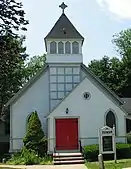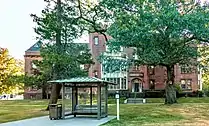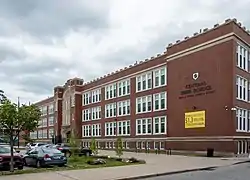Howard Hoppin (April 17, 1856 – October 19, 1940) was an American architect from Providence, Rhode Island.
Early life
Hoppin was born on April 17, 1856, in Providence, Rhode Island. He was a son of Dr. Washington Hoppin (1824–1867), a homeopathic physician, and Louise Claire (née Vinton) Hoppin (1832–1891). Among his siblings were Francis L. V. Hoppin, Louise Claire Hoppin (a founder of the Red Cross),[1] Harriet (née Hoppin) Jacob,[2] and Washington Hoppin, Jr.[3]
Hoppin was from a prominent and talented Providence family; his paternal grandparents were Thomas Coles Hoppin and Harriet Dunn (née Jones) Hoppin.[4] His maternal grandparents were Maj. John Rogers Vinton (who was killed during the Siege of Veracruz and became the namesake of Fort Vinton) and Lucretia Dutton (née Parker) Vinton of Boston. Among his paternal uncles were Augustus Hoppin, a prominent illustrator (who wrote about the family in his novel, Recollections of Auton House),[5] and Dr. Courtland Hoppin, also a homeopathic physician, was the grandfather of Courtland Hector Hoppin, a pioneer in the field of animated film. His maternal uncle, David Hammond Vinton, Quartermaster General of Florida (who married Pamela, a daughter of Maj. Gen. Jacob Brown), was the father of The Right Reverend Alexander Hamilton Vinton, the first Bishop of Western Massachusetts, and Harriette Arnold Vinton (wife of Dr. John Clarkson Jay, son of Dr. John Clarkson Jay).
Career
Hoppin began his architectural practice in Providence in the late 1870s. Early on, he developed a specialty in small churches. He worked alone until 1890, when he was joined by Spencer P. Read and his brother, Francis L. V. Hoppin. The new firm was known as Hoppin, Read & Hoppin.[7] They worked together until 1896, when Francis left to found the firm of Hoppin & Koen in New York City. It was at this time that Hoppin took Edward F. Ely (1858-1920) into the firm, as Hoppin & Ely. In 1907, Ely left to become a member of the city's Board of Park Commissioners.[8] At this point, Frederick E. Field became partner. This arrangement lasted until 1922, when Thomas J. Hill Peirce, joined, the firm becoming Hoppin, Field & Peirce. It was dissolved within a few years, at which point Hoppin appears to have retired.
Architectural works
In private practice, before 1890:
- St. James Episcopal Church, 474 Fruit Hill Ave., Fruit Hill, RI (1879)[9]
- Rathlin (George L. Bradley Estate), Bradley Rd., Pomfret, CT (1882) - Demolished.[10]
- St. Barnabas' Episcopal Church, 3257 Post Rd., Apponaug, RI (1882) - Burned in 1911.[11]
- Christ Episcopal Church, 527 Pomfret St., Pomfret, CT (1883)[10]
- Union Chapel, 1003 Buttonwoods Ave., Buttonwoods, RI (1884)[12]
- Oberthal (Frederick W. Chapin House), 6 Needles Eye Rd., Pomfret, CT (c.1885)[13]
- Rectory for Christ Episcopal Church, 521 Pomfret St., Pomfret, CT (1885)[10]
- Whitfield Apartments, 280-300 Broad St., Providence, RI (1886) - Demolished.[14]
- Truman Beckwith House, 205 Governor St., Providence, RI (1887)[15]
- All Saints Episcopal Church, 111 Greenwich Ave., Pontiac, RI (c.1888)[16]
- Obwebetuck Inn, Sanitarium Rd., South Windham, CT (c.1888) - Burned in 1907.[17]
- St. Mark's Episcopal Church, 10 Turner Ave., Riverside, RI (1888) - Demolished.[18]
As Hoppin, Read & Hoppin, 1890-1896:
- Charles Street Grammar School, 291 Charles St., Providence, RI (1891) - Demolished.[19]
- Olney Street Fire Station, 355 Hope St., Providence, RI (1892)[20]
- Psi Upsilon House, 4 Manning St., Providence, RI (1892) - Demolished in 1972.[21]
- Harry A. Waldron House, 9 Stimson Ave., Providence, RI (1893)[22]
- Howard Hoppin House, 86 Brown St., Providence, RI (c.1894) - The architect's own residence.[23]
- Maxcy Hall, 108 George St., Brown University, Providence, RI (1895) - Altered.[24]
As Hoppin & Ely, 1896-1907:
- Goddard House, Butler Hospital, Providence, RI (1897)[20]
- C. Franklin Nugent House, 67 Orchard Ave., Providence, RI (1898)[25]
- St. Stephen's Episcopal Church (Tower), 114 George St., Providence, RI (1900)[26]
- Weld House, Butler Hospital, Providence, RI (1900)[20]
- President's House, Brown University, Providence, RI (1901) - Demolished 1953.[27]
- Administration Building (Van Wickle Hall), Brown University, Providence, RI (1902) - Demolished 1962.[27][28]
- Caswell Hall, Brown University, Providence, RI (1902)[22]
- Memorial Hall (Remodeling), RISD, Providence, RI (1902) - Built 1853.[29]
- Perimeter Fence, Brown University, Providence, RI (1903)[27][30]
- Lapham Building, 290 Westminster St., Providence, RI (1904)[31]
- Y. W. C. A. Building, 254 Washington St., Providence, RI (1905)[32]
- First Church of Christ, Scientist, 71 Prospect St., Providence, RI (1906–13)[22]
As Hoppin & Field, 1907-1922:
- Horatio E. Bellows House, 96 Alumni Ave., Providence, RI (1908)[33]
- Burroughs Apartments, 372-374 Lloyd Ave., Providence, RI (1909)[25]
- Jenkins Street Primary School, 53 Jenkins St., Providence, RI (c.1909) - Demolished.[34]
- U. S. Post Office, 1619 Lonsdale Ave., Lonsdale, RI (1909) - Built by the Lonsdale Company, leased to the post office.[35]
- E. H. Baker House, 410 S. Washington St., North Attleborough, MA (c.1910)[36][37]
- Varnum Memorial Armory, 6 Main St., East Greenwich, RI (1913)[38]
- St. Barnabas' Episcopal Church, 3257 Post Rd., Apponaug, RI (1917-1926)[39]
- Samuel W. Bridgham School, 359 Carpenter St., Providence, RI (1919)[22]
- Central High School, Fricker St., Providence, RI (1921)[40]
As Hoppin, Field & Peirce, 1922-?:
- Bradford School, Church St., Bradford, RI (1923) - Altered.[41]
- High Street School, 140 High St., Westerly, RI (1923)[41]
- Henry Warner Budlong Memorial Library, 3267 Post Rd., Apponaug, RI (1924–25)[42]
- The Providence, 18 Boulevard Ter., Middletown, RI (1924)[43]
References
- ↑ "Miss Louise C. Hoppin, 100, Red Cross Founder, Dies". Providence Journal. September 18, 1959. p. 30.
- ↑ Social Register, Summer. Social Register Association. 1907. p. 127. Retrieved 28 July 2020.
- ↑ "Washington Hoppin". Hartford Courant. 20 May 1914. p. 9. Retrieved 28 July 2020.
- ↑ Hoppin, Louise Clare (1937). The Hoppin Family: Sketches From Memory. OCLC 754953661. Retrieved 28 July 2020.
- ↑ Haley, John Williams; Martin, Christopher (transcribed by) (1931). "Auton House". www.quahog.org. Quahog.org. Retrieved 28 July 2020.
Originally from an Old Stone Bank educational pamphlet published by the Providence Institution for Savings on March 2, 1931.
- ↑ "First Church of Christ Scientist". Guide to Providence Architecture. Providence Preservation Society. Retrieved 13 February 2021.
- ↑ "Hoppin, Read & Hoppin, Architects". Industries and Wealth of the Principal Points in Rhode Island. 1892.
- ↑ Resolutions and Ordinances of the City Council of the City of Providence. 1920.
- ↑ Historic and Architectural Resources of North Providence, Rhode Island: A Preliminary Report. 1978.
- 1 2 3 Pomfret Street Historic District NRHP Nomination. 1998.
- ↑ D'Amato, Don. A. The Walking Tour of Historic Apponaug Village. 1998.
- ↑ D'Amato, Don A. Images of America: Warwick 1996.
- ↑ American Architect and Building News 1 Jan. 1886.
- ↑ Ontario Apartments NRHP Nomination. 1998.
- ↑ Sanitary Engineer and Construction Record 20 Nov. 1886: iv.
- ↑ American Architect and Building News 12 Jan. 1889: 18.
- ↑ American Architect and Building News 20 Oct. 1888: 182.
- ↑ St. Matthew's Episcopal Church NRHP Nomination. 1991.
- ↑ Annual Report of the Superintendent of Public Buildings for the Year 1891 . 1892.
- 1 2 3 Historic and Architectural Resources of the East Side, Providence: A Preliminary Report. 1989.
- ↑ American Architect and Building News 10 Sept. 1892.
- 1 2 3 4 Woodward, Wm. McKenzie. Providence: A Citywide Survey of Historic Resources. 1986.
- ↑ "RI National Register Search: Hoppin, Howard House". https://www.ri.gov/preservation/search/view.php?idnumber=PROV00968. n.d. Web.
- ↑ Engineering News 19 Jan. 1895: 143.
- 1 2 Wayland Historic District NRHP Nomination. 2005.
- ↑ Alexander, John D. "The Church Building: A Guide to the Church". http://www.sstephens.org/. 2006.
- 1 2 3 Mitchell, Martha. Encyclopedia Brunoniana. 1993.
- ↑ School Board Journal July 1901: 31.
- ↑ Jordy, William H. Buildings of Rhode Island. 2004.
- ↑ Architectural Review July 1904: 76.
- ↑ Downtown Providence: Statewide Historical Preservation Report P-P-5. 1981.
- ↑ Engineering News 9 Feb. 1905: 48.
- ↑ "Olney Street-Alumni Avenue NRHP Nomination" (PDF). 22 March 1989. Retrieved 9 April 2019.
- ↑ Year-Book of the Rhode Island Chapter, American Institute of Architects. 1910.
- ↑ Lincoln, Rhode Island: Statewide Historical Preservation Report P-L-1. 1982.
- ↑ Year-Book of the Rhode Island Chapter, American Institute of Architects. 1911.
- ↑ "Baker House". mhc-macris.net. Massachusetts Historical Commission, n.d. Web.
- ↑ American Contractor 27 Sept. 1913: 56.
- ↑ American Contractor 6 Oct. 1917: 58.
- ↑ Bridgemen's Magazine Oct. 1921: 501.
- 1 2 American Contractor 16 Sept. 1922: 48.
- ↑ warwick Civic Center Historic District NRHP Nomination. 1980.
- ↑ Private Residence, Set of architectural drawings signed HH [Howard Hoppin], Hoppin, Field & Peirce, in association with the Portland Cement Assoc., dated March 1924.


%252C_Providence%252C_RI.jpg.webp)

